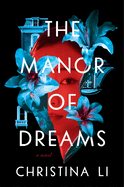
Award-winning children's and young adult author Christina Li (True Love and Other Impossible Odds) spellbinds and unsettles with her adult literary debut about intergenerational grief, The Manor of Dreams. An atmospheric reboot of the haunted house trope set in both the present day and in '70s and '80s Hollywood, Li's novel is as richly textured as it is chilling.
When Nora Deng is summoned with her mother to attend the reading of Vivian Yin's will, she's baffled. She knows almost nothing about Vivian, a now largely forgotten movie star who once made headlines as the first Chinese actress to win an Oscar. Nora's mother, Elaine, the daughter of Vivian's long-ago housekeeper, gives Nora two warnings: don't speak to the Yin family without a lawyer present and never go into the Yin estate's sprawling gardens.
But when Nora arrives at Vivian Yin's Southern California mansion, she finds more than her mother ever could have warned her about. Vivian, who died suddenly and mysteriously, had made a last-minute change in her will to leave the crumbling house and its grounds to Elaine instead of Vivian's daughters. While eldest daughter Lucille insists on staying on the property until she can get the will contested, Lucille's daughter Madeline is just as mystified by the family's clearly fraught history as Nora is. Meanwhile, visions of a woman with dirt spilling from her mouth and roses with a taste for blood begin haunting Vivian's younger daughter, Rennie, and Madeline's waking hours. Soon, it becomes clear even to the most rational-minded Yin that inheriting the estate might be more of a trap than an opportunity. And that the devastating events that happened 30 years ago won't stay buried forever.
Told in alternating perspectives among members of the Deng and Yin families, as well as across decades with flashbacks to Vivian's time as an ingénue, The Manor of Dreams is a bejeweled puzzle box to unlock. Each perspective provides another fragment in the novel's overall portrait of a family ripped apart by the dark secrets underlying the supposed American Dream. But just as Li details the horrors of this dream, her writing illustrates its appeal, too. She limns the novel with lush details, like the Yin estate, with "sun-paled mahogany, glowing reddish in the afternoon light" and "sweet, velvety Guerlain perfume." Such depictions are so compelling that the cause of the novel's ambient dread seems to lie outside the dream. Yet when that simmering horror does finally bubble to the surface, it's the warped reflection of this world's own glamor that the reader is forced to face.
In such moments, Li never shies away from crafting shiver-inducing imagery to haunt even the most seasoned horror reader's nightmares. Much of this imagery delights in the embodiment of rot and overgrowth: Lucille feels "swollen, bloated lips" taking shape on her own face, while Madeline and Nora feel their "blood dripp[ing] onto the vines" that constrain their arms so tightly they become like a secondary set of tendons. The boundaries between these characters and the estate blur past recognition, as what is beautiful and what is grotesque become inseparable. And while casting a haunted house as the externalized encapsulation of internal traumas is perhaps not new in the neo-gothic genre, Li's commitment to linking the appeal of the haunted family estate so closely to the seductive elements of what destroys it is distinctly compelling.
Most importantly, Li never loses sight of the emotional core of this story, even when its setting and imagery sometimes take center stage. Whether digging into the armor of thick skin and suspicion Lucille has cultivated around herself or Nora's tireless desire to succeed and to defend those she loves, Li insightfully cuts into the refracted ways the dual Yin and Deng family history has impacted its offspring. Most biting, perhaps, is Li's depiction of Vivian, the complex matriarch at the novel's heart. Ambitious but also compassionate, young Vivian is thrilled to help her handsome, wealthy new husband rebuild his family's estate, despite its fraught history. But as Vivian works to create a desirable life, amidst a frustrated career and troubled marriage, she comes to see the house as a sarcophagus she's built for herself.
In pivotal moments of decision-making, Vivian carries with her both the overbearing promise of the life she thinks she wants and the suffocating stories she was told as a child: "She remembered how long ago she had heard stories... about how Ming dynasty concubines were buried with their emperor when he died.... She was not going to let her husband ruin her or her children. Vivian Yin had fought tooth and nail to survive in this country. To make sure her children survived. She would not die a good wife." In moments like this, Vivian's fierceness is undeniable, as is the constant atmosphere of claustrophobia in which she lives. Her decisions may be, at times, devastating both to herself and those around her. But what else, Li leads us to wonder, is one supposed to do to avoid being buried alive? By the novel's end, it's not the twisted paths these characters chose to entrap themselves that readers will remember, but the strength of the muscles--literal and figurative--that they employ to rip themselves free of what binds them. --Alice Martin

